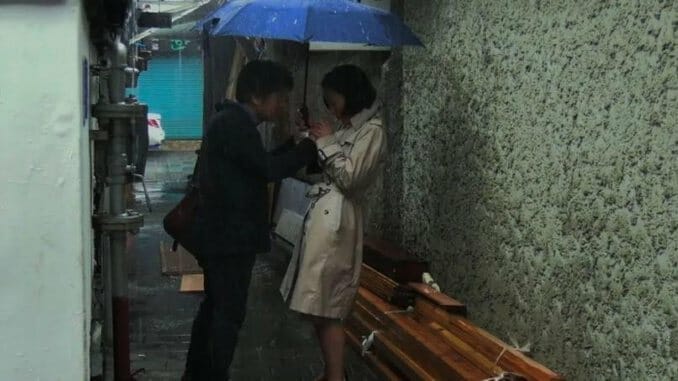In Front of Your Face Is Another Example of Hong Sang-soo’s Careful, Contemplative Cinema

In Front of Your Face, the latest film from master South Korean director Hong Sang-soo, finds Sangok (Lee Hye-young) returning to Korea after a prolonged absence. Temporarily sleeping on her sister Jeongok’s (Cho Yunhee) couch, the siblings seem content and comfortable in their reunion. Immediately upon waking up, the sisters decide to make the most of their morning—after all, they only have so much time together before Sangok’s “late lunch” meeting with a filmmaker to discuss her potential return to the screen. Once a somewhat successful actress in Korea, Songok ditched the profession in favor of moving to the U.S. with some guy she “barely knew” to open a liquor store. The duo sip coffee, smoke cigarettes by a babbling brook and visit Jeongok’s son’s rice cake shop. They spend their morning savoring each other’s company, even if some past conflicts can’t help but crop up.
Apparently, Jeongok feels abandoned by her sister’s extended jaunt abroad—on top of that, she hasn’t visited much since their mother’s death—and Sangok has a devastating secret of her own. Yet In Front of Your Face isn’t concerned with the petty personal grievances loved ones amass over a lifetime. Instead, it fixates on the small revelations that serve as self-imposed curtains between individuals, drawn tightly (and sometimes unintentionally) until a knowing light begs to shine through. “There’s so much we don’t know about each other, right?” Jeongok comments after Sangok reveals a previously undisclosed fear of heights. “Even after growing up together.”
Largely taking place over the course of a single day, In Front of Your Face lingers on life’s little details. A bee pollinating a flower, a marvelous cup of coffee and the momentary salve of a cigarette add as much to the story as the film’s more intense emotional revelations. It’s true that the sisters don’t necessarily possess the fullest pictures of each other—but Jeongok’s perception, even for an out-of-touch sibling who hasn’t responded to her sister’s recent letters, is often scarily spot-on. The beauty of the sparse film is that Hong manages to preserve the daily inconsequence of these one-off remarks and interactions, though they hold so much significance. Sometimes, sisters really do just exist on a deeper level of understanding—it doesn’t really take a whole lot of brainwork to connect the dots. As such, it’s an effortless task to simply soak in the film’s sun-drenched exterior shots, basking in the beauty of a perfect spring day.
-

-

-

-

-

-

-

-

-

-

-

-

-

-

-

-

-

-

-

-

-

-

-

-

-

-

-

-

-

-

-

-

-

-

-

-

-

-

-

-








































